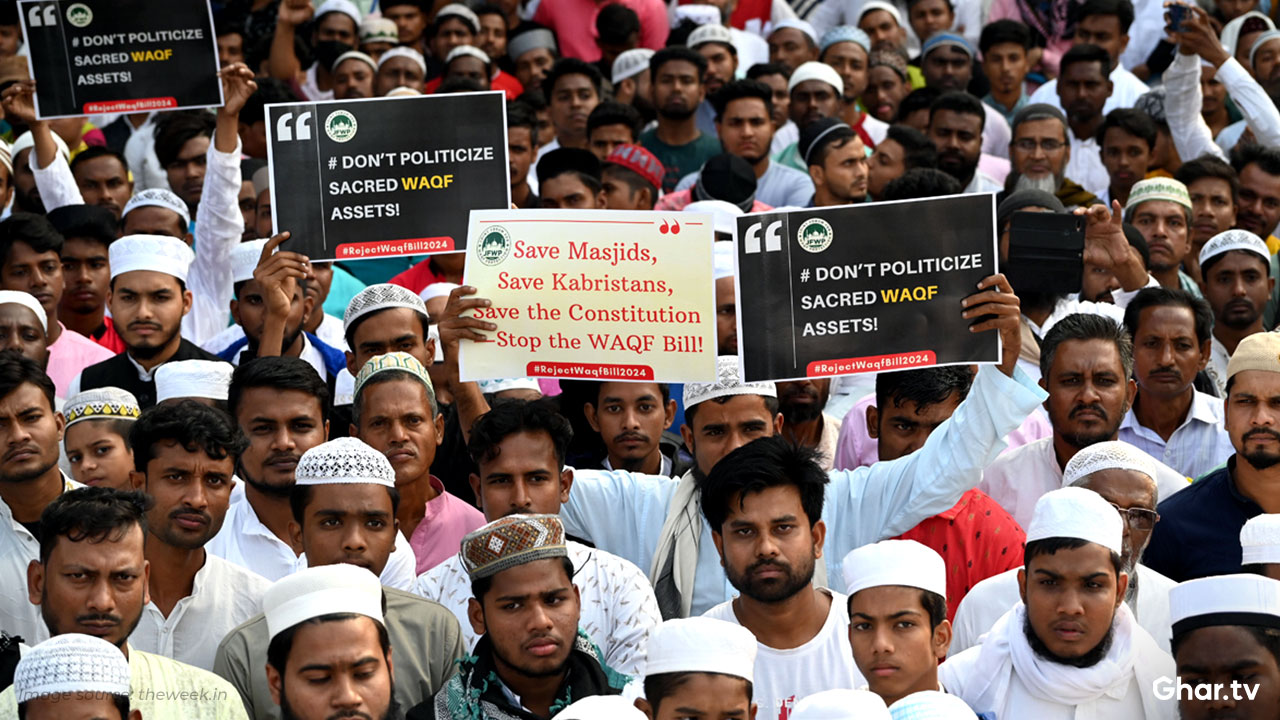Waqf Amendment Sparks Nationwide Protest as Muslims Decry Threat to Property Rights
- 14th May 2025
- 1133
- 0

Never miss any update
Join our WhatsApp Channel
The recent amendment to India’s Waqf Act has triggered significant unrest across the country, particularly among its Muslim population. The Bharatiya Janata Party (BJP)-led central government passed the law in April 2025, granting itself sweeping powers over waqf properties—charitable endowments long administered by Muslim boards. While the government frames the change as a transparency and anti-corruption measure, critics argue it endangers the legal sanctity and community control of centuries-old Muslim religious and charitable assets.
What the Amendment Means
The new law modifies the original 1995 Waqf Act by introducing two key changes. First, it allows non-Muslims to be part of waqf boards—entities traditionally composed of Muslims alone. Second, it empowers the central government to reassess and determine the ownership status of waqf land, including properties without formal documentation.
Waqf properties, which include mosques, seminaries, orphanages, and other charitable institutions, are estimated to number over 870,000 across India, with a total valuation exceeding $14 billion. Historically, these assets were considered immune from state interference and seen as a spiritual and social safety net for underprivileged Muslim communities.
Fears of Dispossession and Disempowerment
Muslim leaders and organizations have denounced the law as discriminatory and an attempt to erode their constitutional rights. The All India Muslim Personal Law Board described the legislation as “communal” and “politically motivated.” Critics argue that it sets a precedent for contesting waqf land ownership, particularly in areas where historical documentation may be lacking.
Mohammed Taufeeq, a waqf board member from Gujarat, warned that the amendment will burden Muslims with proving their ancestral property rights—an onerous process for many. Zafarul Islam Khan, former president of a major Muslim umbrella organization, echoed these concerns, stating that the changes provide a legal pathway for governments and individuals to appropriate waqf assets, even those intended for the welfare of widows, orphans, and the economically disadvantaged.
Kashmir and Beyond
In Jammu and Kashmir, where Muslims form the majority, the legislation has been viewed with suspicion. Religious leaders like Mirwaiz Umar Farooq argue that the law represents an attack on the region's religious autonomy. The cleric labelled it an infringement on religious freedoms guaranteed under the Indian Constitution.
Broader Pattern of Hindu Nationalist Policies
The waqf amendment is the latest in a series of moves perceived to marginalize Indian Muslims. Previous actions include the abrogation of Kashmir’s autonomy, criminalization of triple talaq (instant divorce), attempts to implement a National Register of Citizens (NRC), and alterations to citizenship laws that critics say unfairly target Muslims.
These changes have accompanied rising Hindu nationalism under Prime Minister Narendra Modi’s tenure, with instances of historical revisionism such as attempts to claim the Taj Mahal as a Hindu structure and renaming cities with Islamic heritage. The construction of the Ram Mandir on the disputed site of the demolished Babri Masjid has been a symbolic high point of this shift.
Legal and Social Fallout
The amendment is currently being contested in the Supreme Court. Meanwhile, nationwide protests have erupted, resulting in multiple deaths and over 150 arrests. Legal experts warn that the legislation could erode the secular fabric of India by undermining Muslim property rights and weakening the community’s legal standing.
While the BJP maintains that the law is intended to combat mismanagement and corruption in waqf boards—and also argues that it could help Muslim women receive rightful inheritances—many within the community believe it is part of a broader strategy to dilute their institutional autonomy and property control.
As the debate intensifies, the law’s future now lies in the hands of the judiciary. Until then, Indian Muslims remain deeply concerned about the precedent it may set for the protection of minority rights and religious freedom in the country.
Disclaimer: This article is based on current information available as of May 2025 and reflects the ongoing legal, political, and social discourse surrounding the Waqf Amendment Act. Interpretations or outcomes may evolve as further developments unfold or judicial rulings are made.

 Admin
Admin


Comments
No comments yet.
Add Your Comment
Thank you, for commenting !!
Your comment is under moderation...
Keep reading blogs